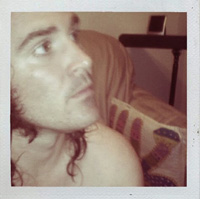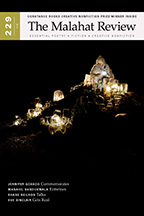The Muted Music of Translation: stephen e. leckie in Conversation
with Donald McGrath

Malahat editorial assistant stephen e. leckie talks with Donald McGrath, winner of the one-time poetry translation contest, les poésies francophones du Canada. Donald's rendition of Robert Melançon's "Elegie écrite dans le parc Notre-Dame-de-Grâce" was chosen as the winner, with a prize of $1,000. The translation will be published in Issue 188, Autumn 2014.
What inspired you about Robert Melançon's "Elégie écrite dans le parc Notre-Dame-de-Grâce"?
I came to it while in the process of translating Robert’s collection L’Avant-printemps à Montréal. I liked the poem’s evocation of dark winter evenings in the city and the emotional darkness in it as well. When the speaker dismisses the dire conclusions he has come to as "hackneyed tropes," it is not to replace them with something more uplifting. He seems rather to have reached such a degree of disillusionment that the only thing left to do is something prosaic, "sensible," namely, return home so as not to catch cold. It’s a dispiriting perception but an emotionally honest one.
Robert Melançon has also translated works by Earle Birney and A.M. Klein. Do you feel that you are responding to a Canadian tradition of poetry and translation? Or does the relationship between the French and English language take precedence?
My answer here is going to be a bit roundabout, so please bear with me. I met Robert last year through Norm Sibum. We were having a few drinks and I asked Robert, out of curiosity, to tell me if there were any books of his that had not been translated but that he would like to see in English. He named a couple and I asked him to send them to me. I picked L’Avant-printemps because of its intimiste depictions of personal life and Montreal in their many respective and overlapping moods. I also liked Robert’s engagement with other traditions, such as those of Norse and English poetry. I hope this answers the first part of your question at least.
Over the years I’ve translated many articles on contemporary art and culture. By the time I met Robert, I’d already grown somewhat tired of doing that. So I was wondering what it would be like to shift to poetry. I’d read a fair amount of poetry in translation, mostly works by European and Latin American authors. I’ve studied Italian so that I can do close readings of Montale and Leopardi. And I’ve translated, as an interesting challenge, some poems by Verlaine, Rimbaud and Mallarmé. Mallarmé is a b-breaker! Can I say that? Anyway, I guess I was already sizing myself up for the task. To go now to the second part of your question, the relationship between French and English had already found a place with me.
Contest judge Donald Winkler observed a "muted music" and "judicious internal rhyme" in the poem. What contributed to your choices for rhyme and meter? Could you describe part of your process when translating poetry?
My decisions with regard to rhyme and metre are based, I would say, on the tone of the original. If that tone happens to be melancholic, for example, I know that the heaviness of that feeling will dictate a certain tempo. I’m guided, of course, by the dips and rises and pauses in the original, but I don’t feel bound to reproduce these at exactly the same places if doing so would throw the translated poem out of joint. It’s a truism, of course, to say that an English-language poem has to be mindful of the tradition of English poetry. I’m not averse to developing a turn of phrase that’s just not possible in the original—subject, of course, to the author’s approval. Sometimes, too, an extra word may be added if a single-word equivalent is incapable of matching the note of urgency in a given French word. For example, the end-stopped onward rush of one poem ending in the imperative va! could not really be conveyed with the single word "go!"
As the speaker "come[s] to feel" the "hackneyed tropes," your use of anaphora with the repetition of "that" is striking. Did those four lines reveal themselves "organically"?
Yes indeed! "Organically" is absolutely the right word for how that came about.
Does the practice of translating Melançon, or other writers, impress your own poetic endeavors?
I tend to go through somewhat extended periods of not writing and, during these periods, translating a writer of Melançon’s calibre keeps me limber, so to speak, keeps the gears working and the horses harnessed. Translating, like reading in another language, also makes it possible to step back and examine one’s own endeavours from an outside vantage point. Sometimes I will come across something in French that seems so specific to the language that I doubt it can be done, or that I could do it, in English. This kind of thing really gets my attention and I begin to consider how I might push the limits of my own medium.

stephen e. leckie
* * * * * * * *









